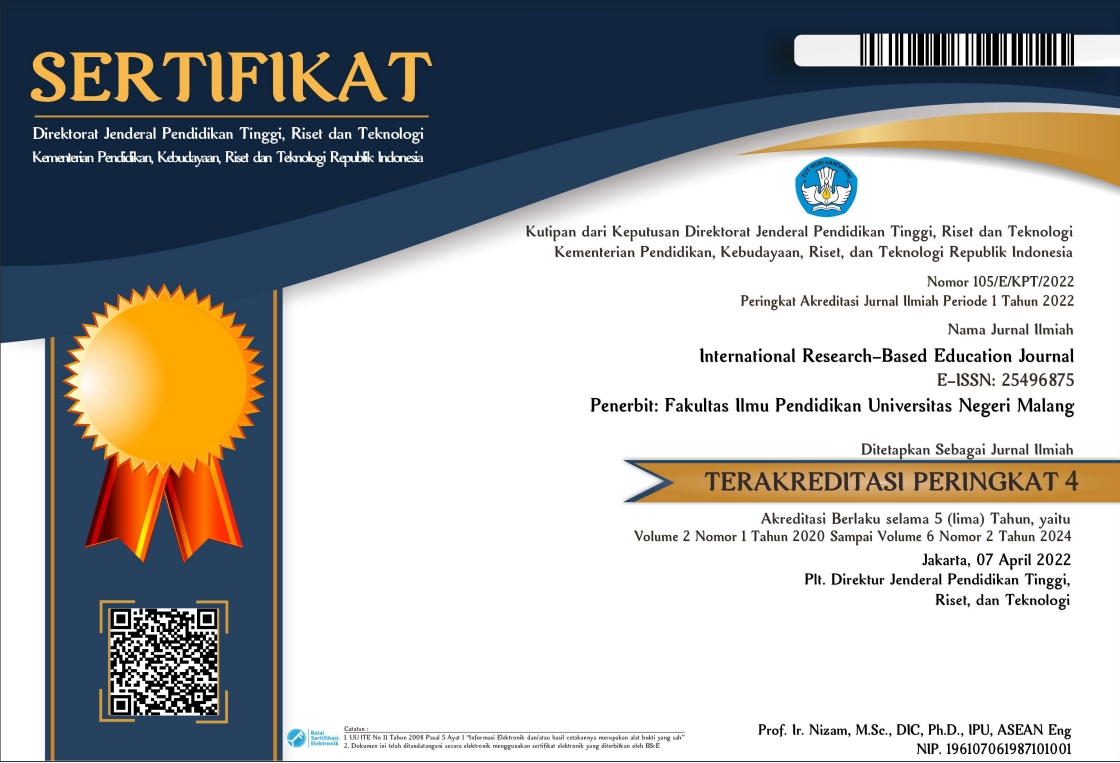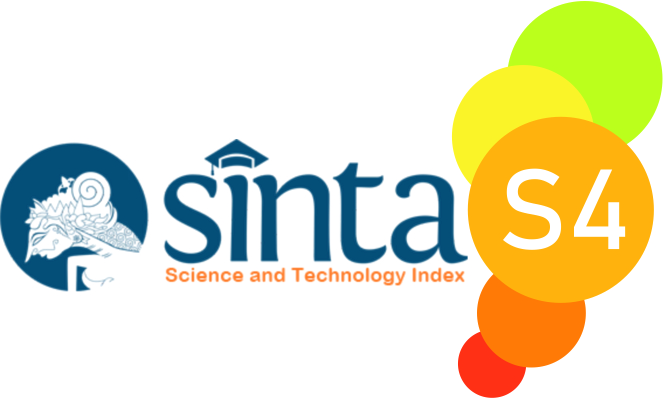Understanding Student Personality Types According To Hippocrates Galenus Theory
Abstract
This writing uses the literature search method by twenty-one electronic databases, namely Google Scholar and Google Book. Research from journals published between 2009-2022. Understanding students' personality types can help identify in solving student problems because each student has its own personality. This writing aims to know and understand students' personalities based on the Hippocrates-Galenus theory. By knowing the characteristics and personality types of each student, individual planning is carried out to help students solve problems.
Keywords
Full Text:
PDFReferences
Adibulasyhar, Muhammad. 2019. Classification of Human Personality Characteristics Based on Hippocrates-Galenus Typology Using the Fk-Nn Method. undergraduate thesis, University of Muhammadiyah Gresik.
Agustina, R., Sujadi, I., & Pangadi. 2013. Thinking Process of Senior High School Students in Problem Solving of Derivative Function Application in terms of Personality Type of Hippocrates-Galenus Typology. Journal of Mathematics Learning. Vol.1.(4).
Alwisol. 2009. Psychology of Personality. Malang: UMM Press.
Armansyah, A. 2022. Homeroom Leadership Style in Psychological Perspective. Hurriah Journal: Journal of Educational Evaluation and Research. vol.3.(1)
Ansori, Aan. 2020. Personality and Emotion. Nusantara Education Literacy Journal.
Vol.1.(1).
Aprilla, Lolita. 2017. Classification of Human Personality Characteristics Based on Hippocrates-Galenus Typology Using Naïve Bayes Method. undergraduate thesis, University of Muhammadiyah Gresik.
Arif, M. 2021. Analysis of Student Metacognition in Solving Logic Relation Problems and Logic Gate Functions in View of the Hippocrates Galenus Typology Personality Type. Edutic Scientific Journal: Education and Informatics. Vol.8.(1).
Azizah, N. D. 2021. The Relationship between the Hippocrates-Galenus Personality Type and the Level of Patience of Students in the Online Lecture System. Journal of Perspective. Vol.5.(1).
Efendi, M. Y., & Abidin, Z. 2017. Analysis of Problem Solving Ability in Solving Mathematical Puzzles based on Personality Type. Journal of Education: Science of Education. Vol.3.(1).
Faiz, A., Kurniawaty, I., & Purwati, P. 2022. Personality Theory Personality Plus Perspective of Florence Littauer. Educative: Journal of Education Science. Vol.4.(4)
Fudyartanta, Ki. 2012. Psychology of Personality. Yogyakarta: Student Library.
Hasanah, M. 2015. Personality Dynamics According to Islamic Psychology. Ummul Qura Journal. Vol.6.(2).
Nilamsari, D. M., & Fitriyani, H. 2021. Student's Thinking Process in Geometry Problem Solving Reviewed from Personality Types Hippocrates-Galenus. Edumatica: Journal of Mathematics Education. Vol.11.(2).
Nurdin, N. 2016. Thinking Flow of Colerical Students in Solving Mathematics Problems Based on Polya's Steps. Journal of Education Biharul Ulum Ma'Arif. Vol.1. (1)
Oktawirawan, D. H. 2020. Triggering Factors for Student Anxiety in Online Learning during the Covid-19 Pandemic. Scientific Journal of Batanghari University Jambi. Vol.20.(2).
Renanti, M. D., & Darmawan, A. C. 2021. Web-based Personality Typology Application for Communication Effectiveness. JTIM: Journal of Information Technology and Multimedia. Vol.3.(1)
Sani, L., Munastiwi, E. 2022. Characteristics of Tahfidz Program Students in the Memorization Process at Al-Muhajirin Purwakarta High School in Review of Hippocrates Galenus Personality Typology. Journal of Islamic Education. Vol.5.(1).
Saputra, D. S. G. S. 2017. Differences in Stress Levels of Students in Working on Thesis Based on Hippocrates-Galenus Personality Type. Doctoral dissertation, Unika Soegijapranata Semarang.
Sholikha, Al'aina Mar'atus, and Muchamad Arif. 2021. Analysis of Student Metacognition in Solving Logic Relation Problems and Logic Gate Functions in terms of the Hippocrates Galenus Typology Personality Type. Edutic Scientific Journal: Education and Informatics. Vol.8.(1).
Sujanto, A., et al. 2004. Psychology of Personality. Jakarta: PT Bumi Aksara.
Wardani, T. K., & Hastari, R. C. 2022. Profile of Students' Critical Thinking Process in Solving Mathematics Problems in View of Personality Type. Edu Cendikia: Scientific Journal of Education. Vol.2.(02)
DOI: http://dx.doi.org/10.17977/um043v6i1p46-52
Refbacks
- There are currently no refbacks.

This work is licensed under a Creative Commons Attribution-NonCommercial-ShareAlike 4.0 International License.










1.png)


